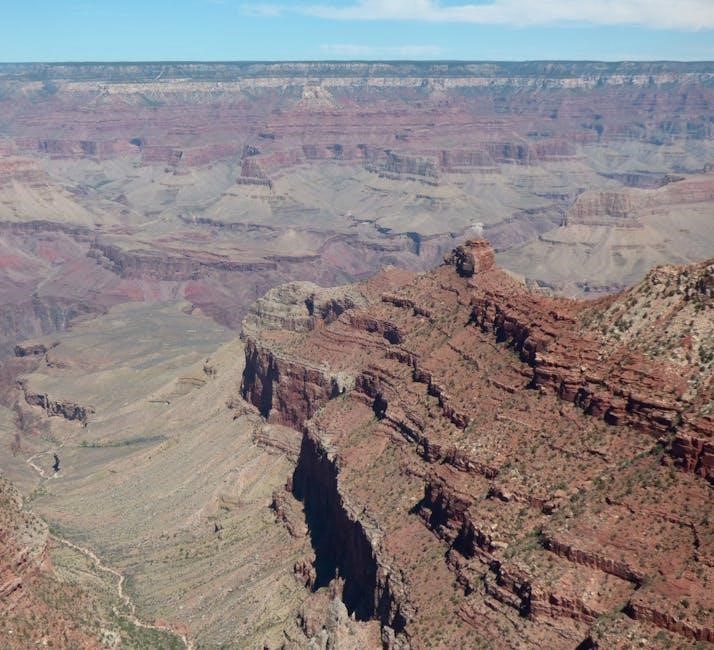An Arizona Last Will and Testament is a legal document outlining how a person’s assets and property should be distributed after their death. Governed by Title 14 of the Arizona Statutes, it allows individuals to express their final wishes, appoint executors, and designate guardians for minors. This document ensures clarity and peace of mind for both the testator and their loved ones.
1.1 Definition and Purpose
An Arizona Last Will and Testament is a legal document that defines how a person’s assets, property, and affairs should be managed and distributed after their death. Its primary purpose is to ensure that the testator’s wishes are carried out, providing clarity and peace of mind for both the individual and their loved ones. This document, governed by Title 14 of the Arizona Statutes, allows the testator to appoint an executor, designate beneficiaries, and specify how their estate should be handled, making it a foundational element of estate planning.
1.2 Legal Basis: Title 14 of Arizona Statutes
The legal foundation for an Arizona Last Will and Testament is established under Title 14 of the Arizona Statutes, which governs trusts, estates, and protective proceedings. This title outlines the requirements for creating, executing, and contesting wills, ensuring compliance with state laws. Key sections, such as ARS 14-2501 and ARS 14-2502, detail the necessary formalities, including the testator’s capacity, signature requirements, and witness attestations. Adhering to these statutes guarantees the validity of the will and the proper administration of the estate according to the testator’s intentions.

Importance of Having a Last Will and Testament
A Last Will and Testament ensures your assets are distributed according to your wishes, appoints guardians for minors, and minimizes conflicts among heirs, providing clarity and peace of mind.
2.1 Ensuring Asset Distribution According to Your Wishes
A Last Will and Testament allows you to specify how your assets, including property, finances, and personal items, should be distributed after your death. This ensures your wishes are carried out, preventing disputes among heirs. In Arizona, the will must comply with Title 14 of the Arizona Statutes, which governs estates and trusts. By clearly outlining your intentions, you maintain control over your legacy, ensuring that your loved ones receive what you intend for them, and minimizing potential conflicts or misunderstandings.
2;2 Appointing a Guardian for Minors
A Last Will and Testament enables parents or legal guardians to appoint a trusted individual to care for their minor children in the event of their death. This provision ensures the well-being and upbringing of minors according to the testator’s preferences. The appointed guardian assumes responsibility for the child’s health, education, and financial needs until they reach legal adulthood. This clause provides peace of mind for parents, knowing their children will be in capable hands, and is a critical component of comprehensive estate planning in Arizona.
2.3 Tax Considerations and Efficiency
A Last Will and Testament in Arizona allows individuals to minimize tax burdens on their estates. By strategically distributing assets, testators can reduce estate tax liabilities. Arizona does not impose a state estate tax, simplifying tax planning. Proper structuring of the will ensures that beneficiaries receive assets efficiently, leveraging exemptions and deductions. Additionally, incorporating trusts or gifting strategies can further optimize tax outcomes. Addressing tax considerations in a will helps protect the value of the estate and ensures assets are distributed according to the testator’s intentions without unnecessary financial losses.

Legal Requirements for a Valid Will in Arizona
A valid Arizona Last Will and Testament requires the testator to be at least 18 years old, of sound mind, and the document must be signed by the testator and two witnesses.
3.1 Who Can Create a Will in Arizona
In Arizona, any individual who is at least 18 years old and of sound mind can create a valid Last Will and Testament. This requirement ensures the testator fully understands the document’s implications. The legal capacity to create a will is outlined under Title 14 of the Arizona Statutes, which governs trusts, estates, and protective proceedings. The testator must sign the document, and it must be witnessed by two individuals who are not beneficiaries. This process ensures the will is legally binding and reflects the testator’s true intentions.
3.2 Necessary Formalities: Signatures and Witnesses
To ensure validity, an Arizona Last Will and Testament must be signed by the testator and witnessed by two individuals. The testator must acknowledge the document in the presence of both witnesses, who then sign it as well. Witnesses should not be beneficiaries under the will to avoid potential conflicts of interest. These formalities, governed by Title 14 of the Arizona Statutes, are essential to confirm the testator’s intent and prevent disputes. Proper execution ensures the will is legally binding and enforceable after the testator’s passing.
3.3 Role of the Testator and Executor
The testator is the individual creating the Arizona Last Will and Testament, responsible for declaring their intent and appointing an executor. The executor, chosen by the testator, manages the estate after their passing. This includes paying debts, distributing assets according to the will, and overseeing probate. The executor must act faithfully, ensuring the testator’s wishes are honored. Both roles are critical to the proper administration of the estate, with the testator setting the plan and the executor carrying it out. Their collaboration ensures a smooth transition of assets and fulfillment of the testator’s final wishes.
Creating Your Arizona Last Will and Testament
Creating an Arizona Last Will and Testament involves drafting a legal document outlining asset distribution, beneficiary appointments, and executor responsibilities. It ensures your wishes are respected.
4.1 Hiring an Attorney vs. Using Online Templates
Hiring an attorney provides personalized legal expertise, ensuring your Arizona Last Will and Testament is tailored to your specific needs and complies with state laws. Attorneys can address complex scenarios, such as large estates or contested family dynamics. Conversely, online templates offer a cost-effective, DIY solution for straightforward cases. Websites provide downloadable PDF forms, allowing individuals to create a will independently. However, templates may lack customization and legal oversight, making them less suitable for complex situations.
4.2 DIY Will Creation: Pros and Cons
Creating a last will and testament yourself using online templates is cost-effective and convenient, offering a straightforward process for simple estates. It allows individuals to maintain privacy and control over their document. However, DIY wills may lack legal expertise, potentially leading to oversights in state-specific requirements or complex scenarios. While suitable for uncomplicated cases, they may not address nuanced situations, such as contested inheritances or special asset distributions, which an attorney could navigate effectively.
4.3 Structure of the Document
An Arizona Last Will and Testament typically includes several key sections. It begins with the testator’s declaration of intent, revoking any prior wills. The document then outlines the distribution of assets, naming beneficiaries and specifying gifts or bequests. It also designates an executor to manage the estate and may appoint a guardian for minor children. Additional sections cover funeral instructions, witness signatures, and notarization, ensuring the will meets legal requirements. This structured format ensures clarity and validity under Arizona law.

Common Mistakes to Avoid
Common mistakes when creating an Arizona Last Will and Testament include not planning for contingencies, failing to update the will after major life changes, and improper execution or witnessing.
5.1 Not Planning for Contingencies
Failing to plan for unforeseen circumstances, such as a beneficiary predeceasing the testator or an executor becoming unable to serve, can lead to legal disputes and delays. Arizona wills must account for such scenarios to ensure assets are distributed according to the testator’s intentions. Without contingency plans, the court may step in, potentially overriding the testator’s wishes. It is crucial to include alternative beneficiaries and executors to avoid such complications. Consulting an attorney can help create a robust will that addresses these potential issues effectively.
5.2 Failing to Update the Will
One of the most common mistakes is not updating the will after significant life changes, such as marriage, divorce, childbirth, or acquiring new assets. Arizona wills must reflect current circumstances to remain valid and effective. Failing to update can lead to legal challenges, unintended distributions, or disputes among beneficiaries. Life events, such as moving to Arizona from another state, may also require revisions to ensure compliance with local laws. Regular reviews and updates are essential to align the will with the testator’s current wishes and evolving personal circumstances.
5.3 Improper Execution and Witnessing
Improper execution and witnessing of a will can lead to its invalidation. Under Arizona law, a will must be signed by the testator and two witnesses who are not beneficiaries. Failure to meet these requirements can result in legal challenges and potential dismissal of the will. Witnesses must attest to the testator’s mental capacity, ensuring they are of sound mind and not under duress. Non-compliance with Title 14 of the Arizona Statutes can cause delays or disputes during probate, emphasizing the importance of proper procedural adherence to uphold the document’s validity and avoid costly legal issues.

Special Considerations
An Arizona Last Will and Testament must address digital assets, pet care, and funeral instructions, ensuring all unique circumstances are covered to reflect the testator’s wishes accurately.
6.1 Digital Assets and Modern Estates
Including digital assets in an Arizona Last Will and Testament is crucial for modern estates. Digital assets include social media accounts, email, cryptocurrency, and other online properties. Arizona law allows individuals to specify how these assets should be managed after death. Testators can grant access rights or dictate deletion of accounts, ensuring privacy and control. It is essential to appoint a trusted executor familiar with digital platforms. Consulting an attorney ensures compliance with Arizona’s legal framework for digital estate planning, avoiding potential disputes or unauthorized access. Proper planning safeguards digital legacies alongside traditional assets.
6.2 Pet Care and Trusts
An Arizona Last Will and Testament allows individuals to ensure the care of their pets after their passing. Pet owners can appoint a trusted guardian to oversee their pet’s well-being and may establish a trust to fund the pet’s care. This provision ensures that pets receive the necessary attention and resources. Including specific instructions for the pet’s health, living arrangements, and financial support provides peace of mind. Consulting an attorney can help create a legally binding plan tailored to the pet’s needs, ensuring their future is secure.
6.3 Funeral Instructions and Wishes
An Arizona Last Will and Testament allows individuals to specify funeral instructions, ensuring their final wishes are honored. This includes preferences for burial, cremation, or memorial services. The document can also designate a person to oversee these arrangements and allocate funds for related expenses. Including such details provides clarity and reduces the burden on loved ones during a difficult time. Clear instructions ensure personal, cultural, or religious preferences are respected, offering peace of mind for both the testator and their family. This section is a thoughtful way to finalize personal affairs.
Probate Process in Arizona
The probate process in Arizona is a legal procedure supervised by the court to validate a will, settle debts, and distribute assets to beneficiaries according to the will’s instructions.
7.1 Understanding Probate: What It Entails
The probate process in Arizona is a court-supervised procedure to validate a will, settle debts, and distribute assets according to the deceased’s wishes. It ensures the will is authentic and legally binding. The court appoints a personal representative, typically the executor named in the will, to manage the estate. Probate involves paying off debts, taxes, and administrative costs before distributing remaining assets to beneficiaries. Proper documentation and compliance with legal requirements are essential to streamline the process and avoid delays.
7.2 How to Avoid Probate
To avoid probate in Arizona, consider establishing a Revocable Living Trust, which allows assets to bypass court oversight. Naming beneficiaries for retirement accounts, life insurance, and real estate through transfer-on-death deeds can also prevent probate. Joint ownership with rights of survivorship ensures property passes directly to co-owners. Additionally, gifting during your lifetime may reduce the estate’s value. Consulting an attorney to tailor these strategies to your situation ensures compliance with Arizona laws and effectively avoids probate, saving time and costs for your heirs.
7.3 Common Probate Issues
Common probate issues in Arizona often arise from invalid wills due to improper execution or lack of witnesses. Contests from heirs claiming unfair exclusion or undue influence can delay proceedings. Executor mismanagement, such as failing to inventory assets or pay taxes, may lead to legal complications. Delays in distribution due to complex asset valuation or disputes over property ownership are frequent. Additionally, tax-related issues, such as unpaid estate taxes, can complicate the probate process, requiring court intervention to resolve these matters effectively.

Contesting a Will in Arizona
A will in Arizona can be contested for reasons such as lack of testamentary capacity, undue influence, improper execution, or fraud, requiring legal action to resolve disputes.
8.1 Grounds for Contesting a Will
A will in Arizona can be contested on several grounds, including lack of testamentary capacity, where the testator was deemed mentally unfit to create the will. Undue influence is another common ground, implying someone pressured the testator into making decisions against their free will. Improper execution, such as missing signatures or witnesses, can also invalidate a will. Additionally, claims of fraud or forgery may arise if the document was altered or created under false pretenses. These issues often require legal intervention to resolve disputes fairly.
8.2 Legal Process and Time Limits
In Arizona, contesting a will involves filing a petition in probate court within a specific timeframe. The legal process typically begins with notifying all parties involved, including beneficiaries and the executor. The court will then review the validity of the will, considering evidence presented by both sides. Arizona law sets a four-year statute of limitations for contesting a will after it has been admitted to probate. Missing this deadline can result in the court dismissing the challenge. Timely action is crucial to ensure the case is heard and resolved fairly.
8.3 Impact of Will Contests on Estate Administration
A will contest can significantly delay estate administration, causing financial and emotional strain on all parties involved. Legal disputes often lead to increased costs, as attorney fees and court expenses accumulate. Beneficiaries may face prolonged waits for asset distribution, and the estate’s value could diminish due to ongoing litigation. Additionally, conflicts among heirs can create lasting familial tensions. Courts prioritize resolving disputes efficiently, but the process can still be lengthy, underscoring the importance of a clear, well-drafted will to minimize potential challenges.

Estate Administration
Estate administration involves managing and distributing the deceased’s assets according to their will. The executor oversees asset inventory, debt settlement, and distribution to beneficiaries, ensuring everything aligns with the testator’s wishes.
9.1 Role of the Executor
The executor plays a crucial role in estate administration, acting as the legal representative of the deceased’s estate. Their primary responsibilities include filing the will with the court, identifying and managing the estate’s assets, paying debts, and ensuring taxes are addressed. The executor must distribute assets according to the will’s instructions while acting in the best interest of the estate. They are also responsible for keeping detailed records and communicating with beneficiaries throughout the process. Proper execution of these duties ensures the deceased’s wishes are honored and the estate is settled efficiently.
9.2 Managing Estate Assets
Managing estate assets involves inventorying, valuing, and safeguarding all property owned by the deceased. This includes real estate, personal property, financial accounts, and digital assets. The executor must ensure these assets are protected from loss or damage and may need to liquidate certain assets to pay debts or taxes. Accurate records must be kept, and the executor must report to beneficiaries on the estate’s status. Proper management ensures assets are distributed according to the will, fulfilling the testator’s intentions and maintaining beneficiary trust.
9.3 Distributing Assets According to the Will
Distributing assets according to the will involves the executor carrying out the testator’s instructions precisely. This includes transferring property, funds, and other belongings to designated beneficiaries. The executor must notify all parties involved and ensure distributions align with Arizona state law. Assets may be distributed outright or held in trusts, depending on the will’s terms. Taxes and debts must be settled before final distribution. The executor’s role is to act faithfully, ensuring the testator’s wishes are honored and legal requirements are met throughout the process.

Tips for Executing Your Will
Ensure your will is signed with two non-beneficiary witnesses. Store it securely, inform your executor of its location, and consider filing a copy with the court. Proper execution ensures your wishes are carried out as intended.
10.1 Choosing Reliable Witnesses
Selecting reliable witnesses is crucial for the validity of your Arizona Last Will and Testament. Witnesses must be impartial individuals who are not beneficiaries of your will. Ideally, they should be acquaintances or professionals familiar with your situation. Ensure they are of legal age and mentally capable of understanding their role. Avoid choosing family members or those with a conflict of interest. It is also advisable to inform them of their responsibilities and ensure they are present to sign the document together with you. Their signatures validate the authenticity of your will, ensuring it holds up legally.
10.2 Storing the Will Safely
Proper storage of your Arizona Last Will and Testament is essential to ensure its availability and integrity. Consider keeping the original document in a fireproof safe, a secure location at home, or a safe deposit box at your bank. Avoid storing it in easily accessible or vulnerable places. Inform your executor of the will’s location to prevent delays or disputes. It is also wise to provide a copy to your attorney or a trusted family member for added security. Ensure the document remains protected from damage or tampering.
10.4 Notifying the Executor
Notifying the executor of your Arizona Last Will and Testament is crucial to ensure they understand their role and responsibilities. Inform them of their appointment and provide a copy of the will for review. Discuss their duties, such as managing estate assets and distributing them according to your wishes. Ensure they are willing and able to fulfill their obligations. Clear communication helps prevent misunderstandings and ensures a smooth estate administration process. Providing contact information and specific instructions can further assist them in carrying out your final wishes effectively.

Updating Your Will
Updating your Arizona Last Will and Testament is essential after significant life changes, such as marriage, divorce, or the birth of a child. Regular reviews ensure your wishes remain current and legally binding, reflecting your evolving circumstances and preferences. This process guarantees that your estate plan continues to align with your goals and provides clarity for your loved ones. Proper updates maintain the document’s validity and effectiveness in Arizona.
11.1 When to Update Your Will
Updating your Arizona Last Will and Testament is crucial after significant life events, such as marriage, divorce, the birth or adoption of a child, or the acquisition of substantial assets. Changes in beneficiary designations, moves to a new state, or shifts in personal wishes also necessitate revisions. Additionally, it is advisable to review and update your will every three to five years to ensure it reflects current circumstances and complies with Arizona laws. Regular updates help prevent legal complications and ensure your wishes remain clear and enforceable.
11.2 How to Update Your Will
To update your Arizona Last Will and Testament, you can either create a new will or execute a codicil, which amends specific portions of the existing document. Both methods require signing and witnessing by two individuals who are not beneficiaries. It is recommended to consult an attorney to ensure the updates comply with Arizona laws and clearly reflect your intentions. Regular legal reviews help maintain the validity and relevance of your will, preventing potential disputes or misunderstandings during estate administration.
11.3 Importance of Regular Reviews
Regularly reviewing your Arizona Last Will and Testament ensures it remains relevant and aligned with your current wishes and circumstances. Life changes, such as marriages, births, deaths, or asset acquisitions, can render parts of your will outdated. Legal updates or shifts in personal priorities may also necessitate revisions. Reviewing your will every few years or after significant life events helps maintain clarity, prevent ambiguities, and ensure compliance with Arizona laws. This proactive approach safeguards your estate plan and provides peace of mind for you and your loved ones.

Resources and Templates
Arizona Last Will and Testament templates are readily available online, offering convenient, legally compliant, and accessible resources for estate planning. These templates ensure your wishes are clearly documented.
12.1 Finding Arizona-Specific Templates
Finding Arizona-specific Last Will and Testament templates is straightforward. Reputable legal websites offer PDF and Word templates tailored to Arizona laws. Ensure the template complies with Title 14 of the Arizona Statutes. Look for platforms offering free downloads, such as legal aid websites or estate planning services. Verify the template includes sections for asset distribution, executor appointment, and witness signatures. Always cross-check for updates to ensure compliance with current state laws before finalizing your document.
12.2 Free PDF Templates Online
Free Arizona Last Will and Testament PDF templates are readily available online, offering a convenient way to create a legally binding document. These templates are downloadable and printable, allowing individuals to outline asset distribution, beneficiary designations, and executor appointments. Ensure the template complies with Title 14 of the Arizona Statutes for validity. Many legal websites and estate planning platforms provide these resources, enabling users to personalize the document according to their wishes while adhering to state-specific requirements.
12.3 Legal Aid and Consultation
For individuals needing guidance on creating an Arizona Last Will and Testament, legal aid and consultation services are available. Consulting an attorney ensures the document complies with Title 14 of the Arizona Statutes and addresses complex estate planning needs. Legal aid organizations and online platforms offer resources for those who cannot afford private legal representation. Additionally, many websites provide free templates and step-by-step instructions, supported by legal professionals to ensure the will is valid and meets all state requirements effectively.

Be First to Comment